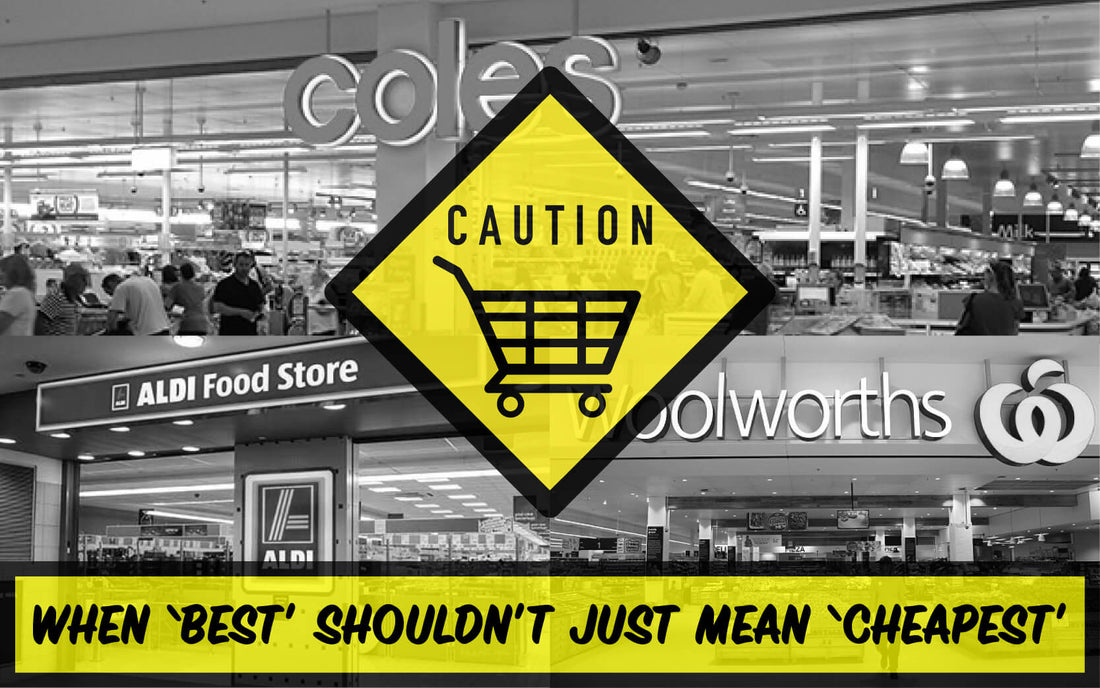Forget the cheapest supermarket. Which one is the most ethical?
Every so often, on the nightly current affairs TV shows or in magazines and newspapers, I see stories discussing which Aussie supermarket is the “cheapest” offering the best deals for customers.
They’ll pit the big two players – Coles and Woolworths – against Aldi and look at what a trolley of groceries will cost you in each store before determining which is the “best” supermarket for people to shop at. But all those great bargains and deals on offer often come at a cost to others.
While I know that nobody likes the idea of overpaying for anything, I think it would be refreshing to see an in-depth investigation into which supermarket chain is the most ethical in terms of what it pays its staff, its suppliers and its commitment to the environment.
I have built my business on the belief there are lots of conscious and ethical customers out there who are mindful of sustainable consumerism – not just in terms of environmental impact, but who care about the working conditions of farmers and workers in the developing world.
The supermarket chains, on the other hand, don’t appear so concerned. Not only do they import lots of goods manufactured by overseas workers who are paid a pittance, if that, they have also been caught exploiting Aussie farmers, which causes enormous social problems. They don’t even always pay their supermarket staff appropriately either.
If such a comparison was made, there are several things I’d like to see revealed so consumers can make the best choice.
For example, which supermarket offers its staff the best deal in terms of wages and conditions? Not just the staff working in the shops, but contractors such as shopping trolley collectors as well.
Last year, the media revealed an Ernst & Young report that showed Coles knew it was underpaying more than half its workers to the tune of around $70 million a year in labour savings. Perhaps they should change their marketing slogan to “down, down, wages are down” as a nod to how the supermarket giant’s shareholders get nice, fat profits, but the staff at the coal face struggle to put food on their own families’ tables.
In 2015 Coles also came under fire from the Transport Workers Union for forcing its truck drivers to perform illegal practices – which could lead to death and injury – to transport goods to its stores. Truckies who didn’t comply risked losing their jobs, and their livelihoods.
Woolworths isn’t much better. A Fair Work Australia investigation last year showed trolley collectors at one in three Woolies supermarkets were being underpaid and exploited, with some getting cash-in-hand for as low as $10 per hour.
The rates of pay provided by the trolley-collection companies Woolworths outsource to were well below the legal minimums. And many of the workers were from foreign countries like Syria, Iraq, Iran, India, Sudan and Korea, which, according to the report, are vulnerable to exploitation and coercion.
I’d like to also know which of the supermarkets looks after its suppliers and doesn’t force them to pay exorbitant placement fees, or demand 90 day payment terms.
Which supermarket chain doesn’t exploit Australian farmers? The exploitation of Australian dairy farmers is pretty well documented – we know that the supermarkets selling milk for $1 per litre can have disastrous consequences for the dairy farmers’ ability to make a living.
Dairy farmers aren’t the only ones who feel the squeeze. Citrus growers, for example, have been getting a raw deal from the supermarkets too, with reports last year of many Aussie growers bulldozing their trees because they can’t compete with cheap imports from overseas.
Then there’s the question of supermarkets providing products that have been grown or manufactured by exploiting workers both at home and abroad.
A Four Corners investigation in 2015 revealed Coles, Woolworths, Aldi and IGA sell products supplied by farms and factories exploiting workers on 417 working holiday visas. The program found some of the worst examples included workers forced into 22 hour shifts without toilet breaks as well as revealing allegations of sexual abuse.
Woolworths, Coles and Aldi have all been caught out selling seafood provided by a Thai company that uses forced labour, including child labour, to supply its products.
The supermarkets also stack their shelves with canned tomatoes from Italy that have been produced by companies with mafia connections using workers, often asylum seeker refugees, subjected to brutality and slave labour.
It’d also be good to know which supermarket is doing the best by the environment by developing closed-loop systems for waste created by products that they sell. France has adopted a law where supermarkets are forced to donate any of their unsold food to those in need to cut back on waste. No such law exists in Australia. While our supermarkets donate some of their excess products, a lot still works its way into landfill.
For consumers who want to purchase ethically sourced groceries, navigating the supermarkets is a minefield and the bottom line is all the major players have a black mark against them in at least one area, if not all. The only language supermarkets understand is the language of money.
As author and sustainability advocate, Anna Lappe rightly points out: “every time you spend your money, you’re casting a vote for the kind of world you want.”
What the planet and many of your fellow human beings need is for your money to not only talk, but to scream.
Nick Savaidis
Founder of Etiko P/L
2016 Human Rights Award Winner (Business Category)
2013-2016 Highest Ranking for Ethical Production, Australian Fashion Report
Links:
http://www.smh.com.au/national/investigations/major-supermarkets-selling-the-fruit-of-forbidden-labour-20161201-gt1w0l.html
http://www.abc.net.au/news/2015-06-04/coles-truck-drivers-under-pressure-to-break-the-law/6522816
http://www.businessinsider.com.au/australian-supermarket-competition-is-great-for-consumers-but-it-could-ruin-the-economy-2015-7
http://www.independent.co.uk/environment/least-ethical-british-supermarkets-named-following-french-ban-on-stores-throwing-food-away-a6858936.html
http://www.abc.net.au/news/2015-12-15/major-australian-supermarkets-implicated-in-child-labour/7031350
http://www.smh.com.au/business/workplace-relations/rampant-exploitation-of-woolworths-trolley-workers-revealed-20160624-gprari.html
http://www.smh.com.au/business/workplace-relations/coles-knew-more-than-half-its-workers-were-underpaid-20160819-gqwk54.html
http://www.dailytelegraph.com.au/news/suppliers-to-australias-biggest-supermarket-chains-using-slave-labour-conditions-on-aussie-farms/news-story/a18a654ae83f3c5f1cd07cd33249aaf0
http://www.news.com.au/finance/business/other-industries/the-other-side-of-the-milk-crisis/news-story/fb71436211005c7f92a814cab54b04bf
http://www.news.com.au/finance/business/retail/woolies-aldi-and-coles-admit-to-child-slavery-seafood-link/news-story/7285941622ab22115895ce2af20936e4
When “best” shouldn’t just mean “cheapest”


Leave a comment